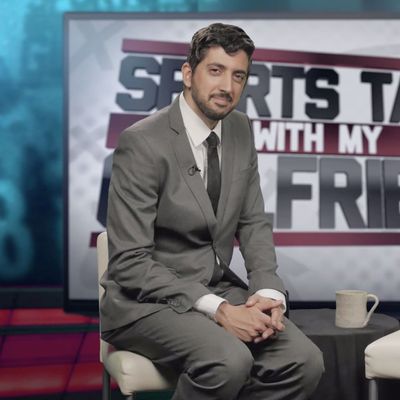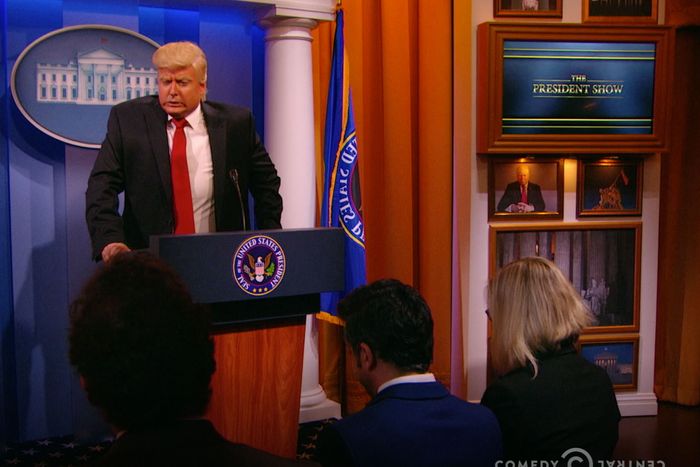
A couple years ago I got something most comedians only dream of: an interview with a showrunner of a TV show for a spot on a writing staff. My manager had reached out and said a sketch-comedy show on a major cable channel was looking to hire Latino writers. I had made the list of people they wanted to submit.
It’s very difficult to explain how I made this list, but I want to lay out my experience to help paint a picture. I had been doing sketch comedy for years. I had directed four house teams at the Upright Citizens Brigade and directed several shows that ran for a few months at the theater. I had also written and performed in several of my own sketch shows. My sketch show God Hates You was the first running sketch show at the Annoyance in New York, and my show Detective Sully was invited into the 2018 New York Comedy Festival along with another show I directed, Los Profesores. I have a YouTube sketch channel called Pantry Boy, and its sketches have been featured on Funny or Die. I had written, produced, and starred in a web series for IFC’s Comedy Crib, and I also produced a few sketches for NBC’s Latino sketch website, Más Mejor.
The network was going to send me the pilot, and within 48 hours I was to send them a sample of whatever I wanted that fit the tone of the show. I had submitted to late-night shows before, but something felt different about this. I loved the pilot, and an entire episode basically exploded out of me. A few days later I got an email that made me jump out of my chair. The people at the network said they “loved” my work, and they asked me to interview with three men: the showrunner, the director, and the star of the show. I just needed to send a résumé.
Maybe this is just my moderately sized circle of friends, but nobody I knew had a résumé. They all told me they got hired on shows off their packets or interviews. One friend who had written on three shows and had an Emmy told me the last time they wrote a résumé was when they applied to be a shift manager at Applebee’s. So I just took my work résumé and replaced all of my IT experience with comedy experience. Special Skills? Fluent in Spanish.
Through these conversations with friends, I also learned that none of them had ever really been interviewed for a job before. They all said you basically just hang out and they see if you’re cool. I pressed everyone for the hardest question they got, but only one person said they were once asked what shows they liked.
“That one was hard,” they explained, “but I made something up.”
Unfortunately the interviewers were all in L.A., but they said we could Skype. To set the scene, I’d like to add that my apartment is right next to a loud aboveground subway train. So, in August, I had to close my window and turn off my rickety air conditioner. Regretfully I also decided to wear a tie, white shirt, and blue suit jacket.
The interview began. We introduced ourselves and everybody was very friendly. I’m also part of the hiring committee at my IT job, and I’ve conducted hundreds of interviews. So I felt very comfortable on this side of it. Be gracious, give concrete answers, don’t waste their time, I reminded myself. The star of the show asked me what I thought about the pilot, and I told them it really spoke to me. The group said they liked my packet, and I said I was actually inspired by the show, which they appreciated. We were off to an unbelievable start.
I can’t believe I am about to be hired on a writing staff, I told myself.
Then the star of the show asked, “Okay, Alexis, are you ready?”
I remember this moment very clearly because I was so euphoric, I thought they were about to say I was hired. We had been talking for five minutes, and based on what all of my friends had said, this interview was going well.
“I’m ready,” I said with a big smile.
The showrunner then looked down at a piece of paper and read me the following question like I was in a presidential debate and he was Wolf Blitzer:
“Describe the TV shows you have written for, and please emphasize the shows that are similar in tone and style to this one.”
When people ask me for job-interview advice, a common question is what to say to a question you can’t answer. I always advise them to try to think of any experience they have that may be relevant, and try to make it work as an answer. So I began talking about my IFC web series. It wasn’t totally irrelevant because IFC had even aired those sketches on TV. They even laughed at a few of the premises. But a few sentences in, I was interrupted.
“Wait, isn’t Comedy Crib a web series?” the showrunner asked.
“Uh, yes, it was on the web, but also on TV.”
“Okay, forget about that. What TV series have you helped develop?”
It was at this point that I realized we were on totally different wavelengths. Here I was, a young Latino writer thinking he was about to get his first staff writer job, and they were hoping I was Chuck Lorre.
“Well, I guess if you put it that way, I’ve never really worked on a TV series before.”
You know how in courtroom dramas sometimes the witness will say something the defense doesn’t like, so the defense team starts looking at each other and whispering while shuffling papers? That was exactly what I was looking at. Finally the showrunner put his hands up.
“We can’t hire you.”
What a gut punch. Here I thought I was doing really well, when in fact I was doing so badly that it was the rare occasion where you are told you aren’t getting the job during the interview. Even though I wanted to open my window and hop in front of the oncoming train a few feet from my apartment, I kept calm and tried to regain my composure.
“Oh, you … Wow, why is that?” I said with the feigned cheeriness of a kidnapping victim pretending there isn’t a gun to his back.
“I can’t hire a person who’s never written on TV. I need people who can write every day and know what it’s like to be in an office.”
I replied to this with the all-time loserest thing ever:
“But I do know how to work in an office. I’m an IT supervisor.”
They were now staring at me like I interrupted their lunch.
“Well, we have to move on, but we loved your packet and hope you keep on working.”
And they ended the call. I no longer cared that I was sitting in a rice cooker. I wanted to burn.
Now, you’re probably wondering why I torpedoed my own comedy career by sharing this story. Two reasons: First, I want to help make a change for the next person. I understand that every spot on TV is valuable, but an acute emphasis on TV experience is lazy. I’m pretty sure comedy legends like Steve Martin and Woody Allen got their start in comedy by writing a telegram full of jokes to a head writer. I wish I could write a telegram full of jokes. Instead I have to write and produce my own network sitcom while personally negotiating a contract with the Teamsters.
“You need three guys to work the camera jib, Jimmy?! You’re killing me!”
The second reason I shared this story is that it is so stupid it makes me laugh. There are probably people out there who’ve been through something similar, and if my misfortune makes them feel seen or makes them laugh in that weird, Oh, yes, I have the same trauma way, then I’ve done my job.
I am, at the end of the day, an optimist. I am hopeful that things will change for future writers and performers. I hope that “experience” and connections play less of a role in finding new and exciting talent, and we can get a great show from a person who might not have otherwise gotten the chance.
And I hope that when that person interviews me for a staff position on their show, they are okay with me not having a writing credit on Frasier.


